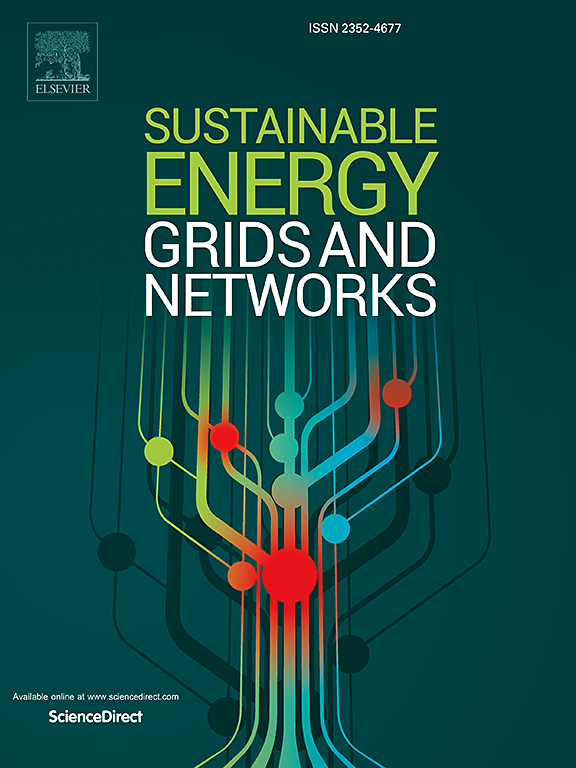区块链驱动的转型:地方能源网络的去中心化规划和安全的点对点交易
IF 4.8
2区 工程技术
Q2 ENERGY & FUELS
引用次数: 0
摘要
本文介绍了一种新颖的基于区块链的本地能源网络自动负载响应架构,重点关注安全的点对点(P2P)能源交易和去中心化规划。与传统的集中式方法不同,所提出的系统利用非合作博弈论进行基于定价的分散式规划,从而在没有中央机构的情况下实现高效的资源分配。该系统的一个重要贡献是整合了机器管理的智能合约机制,确保了 P2P 能源交易中交易的安全性、透明性和一致性。此外,交易节点的自适应评估系统增强了系统对动态能源需求的响应能力。我们还开发了一种分布式算法来优化该架构的实施,从而确保实际效率。案例研究证实,该系统在运行效率、安全性和经济效益方面都有明显改善,标志着分散式能源管理取得了重大进展。主要研究结果表明,与传统方法相比,所提出的自动负荷响应策略大大提高了负荷曲线的稳定性,净负荷波动减少了 99.16%,运营成本降低了 8.24%。此外,该框架还可将可再生能源的自消耗率提高 14.62%,并将电动汽车 (EV) 用户的平均成本降低 26.12%。这些结果凸显了该框架在确保经济和计算效率的同时,在促进本地能源网络内部供需关系更加平衡方面的有效性。这项研究强调了彻底改变分散式能源管理的潜力,为未来的能源系统提供了一种可持续和具有成本效益的解决方案。本文章由计算机程序翻译,如有差异,请以英文原文为准。
Blockchain-enabled transformation: Decentralized planning and secure peer-to-peer trading in local energy networks
This paper introduces a novel blockchain-based automatic load response architecture for local energy networks, focusing on secure peer-to-peer (P2P) energy trading and decentralized planning. Departing from traditional centralized methods, the proposed system leverages non-cooperative game theory for pricing-based decentralized planning, enabling efficient resource distribution without a central authority. A key contribution is the integration of a machine-governed smart contract mechanism, which ensures secure, transparent, and consistent transactions in P2P energy trading. Additionally, an adaptive evaluation system for transaction nodes enhances the system’s responsiveness to dynamic energy demands. A distributed algorithm is developed to optimize the implementation of this architecture, ensuring practical efficiency. Case studies confirm significant improvements in operational efficiency, security, and economic outcomes, marking a substantial advancement in decentralized energy management. Key findings demonstrate that the proposed automatic load response strategy significantly enhances load curve stability, achieving a 99.16 % reduction in net load fluctuations and an 8.24 % reduction in operational costs compared to traditional methods. Additionally, the framework improves the self-consumption rate of renewable energy by up to 14.62 % and reduces the average cost for electric vehicle (EV) users by 26.12 %. These results highlight the framework's effectiveness in fostering a more balanced supply-demand relationship within local energy networks while ensuring economic and computational efficiency. The study underscores the potential to revolutionize decentralized energy management, offering a sustainable and cost-effective solution for future energy systems.
求助全文
通过发布文献求助,成功后即可免费获取论文全文。
去求助
来源期刊

Sustainable Energy Grids & Networks
Energy-Energy Engineering and Power Technology
CiteScore
7.90
自引率
13.00%
发文量
206
审稿时长
49 days
期刊介绍:
Sustainable Energy, Grids and Networks (SEGAN)is an international peer-reviewed publication for theoretical and applied research dealing with energy, information grids and power networks, including smart grids from super to micro grid scales. SEGAN welcomes papers describing fundamental advances in mathematical, statistical or computational methods with application to power and energy systems, as well as papers on applications, computation and modeling in the areas of electrical and energy systems with coupled information and communication technologies.
 求助内容:
求助内容: 应助结果提醒方式:
应助结果提醒方式:


